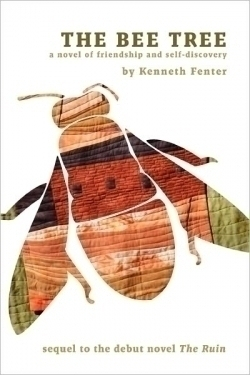The Bee Tree
Set in rural southwestern Colorado in 1955, The Bee Tree is the sequel to Kenneth Fenter’s 2010 novel, The Ruin, in which readers first met Clifton Kelly, a young boy who runs away from home to escape being maliciously bullied at school and in the community; his year-long solitude in an ancient and previously undiscovered Anasazi cliff dwelling puts him on intimate terms with nature and the spiritual world and teaches him about life-saving survival skills. The Bee Tree takes readers back and forth through time as Cliff, recently retired from his teaching career and attempting to recover from the memory of a school shooting, recalls how his Anasazi experience had equipped him to return to his family’s farm a year away, and confront his tormentors with a maturity and spiritual depth far beyond his years.
Teen readers will be able to empathize with Cliff, who not only was ostracized and bullied for being an Anglo child in a predominantly Hispanic school, but was also tormented by an older, emotionally disturbed Anglo youth, Larry Harris. When Cliff returns from his wilderness sojourn, he befriends Hector Rodriguez, the Hispanic bully, but finds himself in a life-and-death conflict with Harris. Now a young soldier injured in the Korean War, Larry Harris is AWOL, armed, and angry, and he seeks to destroy both Cliff and Angelina, whose friendship would grow into love and, later, marriage.
Fenter is a gifted storyteller with an engaging writing style and a seemingly natural sense for effective plot and pacing. Blessed with a good eye for detail, he is able to impart a sense of place and landscape without overwhelming the reader with elaborate descriptions. Although his handling of the information about the background of the area, its farming culture, and bee-keeping can occasionally be a bit didactic, Fenter does engage the reader in the lives and concerns of his characters and the history of the place they call home.
The Bee Tree addresses topics as wide-ranging and timely as racial and cultural relations, religious intolerance, the horrors of war, bullying, mental illness, and illiteracy. Its protagonists thrive and prevail because of their strength and resilience, clear thinking, willingness to take risks, and respect for the human and natural worlds. A hint of magic helps, too. Fenter beautifully describes both the blossoming of teen love based on honor and respect and the love between family members that enables them to surmount their differences.
The book is marred by typographical errors, misspellings, missing or incorrect punctuation, a few awkward scene changes that leave the reader disoriented, and even a name change that throws the wrong antagonist into a scene. That it remained an enjoyable read despite such errors demonstrates Fenter’s ability to create a real page-turner that will be enjoyed by young adult and mature readers alike.
Fenter is a retired high school language arts teacher and the author of numerous short stories and a series of three nonfiction books under the heading An American Family in Japan. He is co-editor of an anthology of Fenter family history.
Reviewed by
Kristine Morris
Disclosure: This article is not an endorsement, but a review. The publisher of this book provided free copies of the book and paid a small fee to have their book reviewed by a professional reviewer. Foreword Reviews and Clarion Reviews make no guarantee that the publisher will receive a positive review. Foreword Magazine, Inc. is disclosing this in accordance with the Federal Trade Commission’s 16 CFR, Part 255.

